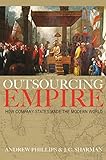Outsourcing Empire : How Company-States Made the Modern World / Andrew Phillips, J C Sharman.
Material type: TextPublisher: Princeton, NJ : Princeton University Press, [2020]Copyright date: ©2020Description: 1 online resource (272 p.) : 9 mapsContent type:
TextPublisher: Princeton, NJ : Princeton University Press, [2020]Copyright date: ©2020Description: 1 online resource (272 p.) : 9 mapsContent type: - 9780691206196
- 9780691206202
- International cooperation -- History
- International trade -- History
- HISTORY / Modern / General
- Adam Clulow
- Ann Carlos
- Between Monopoly and Free Trade
- Christopher Nierstraz
- Commerce by the Frozen Sea
- David Veevers
- Emily Erikson
- Frank Lewis
- Freedom's Debt
- In the Shadow of the Company
- Michael Wagner
- Philip Stern
- The Company and the Shogun
- The Company-State
- The Corporation as a Protagonist in Global History
- The Dutch and English East India Companies
- The English Chartered Trading Companies
- Tristan Mostert
- William Pettigrew
- colonialism
- international politics
- international studies
- privateering
- world history
- 909.08 23
- D210 .P45 2020
- online - DeGruyter
- Issued also in print.
| Item type | Current library | Call number | URL | Status | Notes | Barcode | |
|---|---|---|---|---|---|---|---|
 eBook
eBook
|
Biblioteca "Angelicum" Pont. Univ. S.Tommaso d'Aquino Nuvola online | online - DeGruyter (Browse shelf(Opens below)) | Online access | Not for loan (Accesso limitato) | Accesso per gli utenti autorizzati / Access for authorized users | (dgr)9780691206202 |
Browsing Biblioteca "Angelicum" Pont. Univ. S.Tommaso d'Aquino shelves, Shelving location: Nuvola online Close shelf browser (Hides shelf browser)

|

|

|

|

|

|

|
||
| online - DeGruyter Constructing Community : Urban Governance, Development, and Inequality in Boston / | online - DeGruyter Figures of the Future : Latino Civil Rights and the Politics of Demographic Change / | online - DeGruyter The Author of Himself : The Life of Marcel Reich-Ranicki / | online - DeGruyter Outsourcing Empire : How Company-States Made the Modern World / | online - DeGruyter Flowers of Time : On Postapocalyptic Fiction / | online - DeGruyter Political Entrepreneurs : The Rise of Challenger Parties in Europe / | online - DeGruyter The Campus Color Line : College Presidents and the Struggle for Black Freedom / |
Frontmatter -- Contents -- Acknowledgments -- Introducing the Company-State -- Chapter One. The Rise of the Company-States -- Chapter Two. Company-States in the Atlantic World -- Chapter Three. The Fall of the Company-States -- Chapter Four. The Resurrection of the Company-States -- Conclusion -- References -- Index -- A Note on the Type
restricted access online access with authorization star
http://purl.org/coar/access_right/c_16ec
How chartered company-states spearheaded European expansion and helped create the world's first genuinely global orderFrom Spanish conquistadors to British colonialists, the prevailing story of European empire-building has focused on the rival ambitions of competing states. But as Outsourcing Empires shows, from the seventeenth to the twentieth centuries, company-states-not sovereign states-drove European expansion, building the world's first genuinely international system. Company-states were hybrid ventures: pioneering multinational trading firms run for profit, with founding charters that granted them sovereign powers of war, peace, and rule. Those like the English and Dutch East India Companies carved out corporate empires in Asia, while other company-states pushed forward European expansion through North America, Africa, and the South Pacific. In this comparative exploration, Andrew Phillips and J. C. Sharman explain the rise and fall of company-states, why some succeeded while others failed, and their role as vanguards of capitalism and imperialism.In dealing with alien civilizations to the East and West, Europeans relied primarily on company-states to mediate geographic and cultural distances in trade and diplomacy. Emerging as improvised solutions to bridge the gap between European rulers' expansive geopolitical ambitions and their scarce means, company-states succeeded best where they could balance the twin imperatives of power and profit. Yet as European states strengthened from the late eighteenth century onward, and a sense of separate public and private spheres grew, the company-states lost their usefulness and legitimacy.Bringing a fresh understanding to the ways cross-cultural relations were handled across the oceans, Outsourcing Empire examines the significance of company-states as key progenitors of the globalized world.
Issued also in print.
Mode of access: Internet via World Wide Web.
In English.
Description based on online resource; title from PDF title page (publisher's Web site, viewed 26. Mai 2021)


